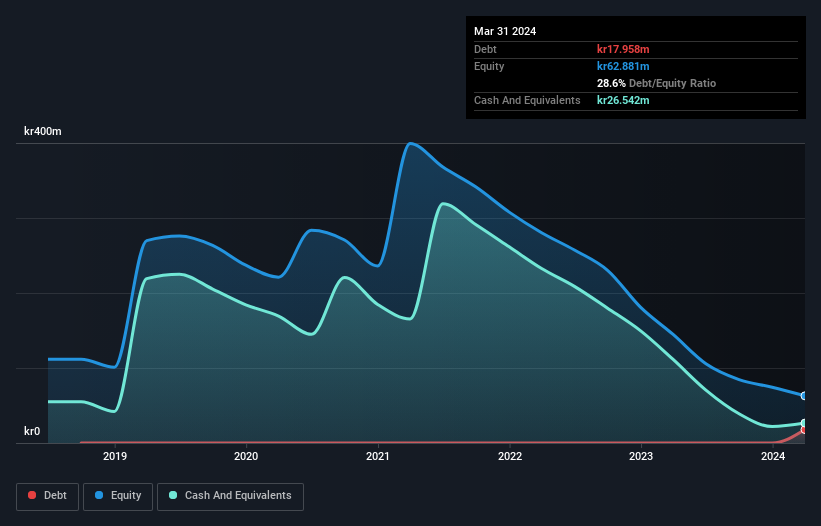
David Iben put it well when he said, 'Volatility is not a risk we care about. What we care about is avoiding the permanent loss of capital.' So it seems the smart money knows that debt - which is usually involved in bankruptcies - is a very important factor, when you assess how risky a company is. As with many other companies Ascelia Pharma AB (publ) (STO:ACE) makes use of debt. But should shareholders be worried about its use of debt?
Why Does Debt Bring Risk?
Debt and other liabilities become risky for a business when it cannot easily fulfill those obligations, either with free cash flow or by raising capital at an attractive price. Part and parcel of capitalism is the process of 'creative destruction' where failed businesses are mercilessly liquidated by their bankers. However, a more common (but still painful) scenario is that it has to raise new equity capital at a low price, thus permanently diluting shareholders. By replacing dilution, though, debt can be an extremely good tool for businesses that need capital to invest in growth at high rates of return. When we think about a company's use of debt, we first look at cash and debt together.
See our latest analysis for Ascelia Pharma
What Is Ascelia Pharma's Net Debt?
The image below, which you can click on for greater detail, shows that at March 2024 Ascelia Pharma had debt of kr18.0m, up from none in one year. But it also has kr26.5m in cash to offset that, meaning it has kr8.58m net cash.

How Healthy Is Ascelia Pharma's Balance Sheet?
We can see from the most recent balance sheet that Ascelia Pharma had liabilities of kr11.2m falling due within a year, and liabilities of kr18.0m due beyond that. On the other hand, it had cash of kr26.5m and kr1.91m worth of receivables due within a year. So it has liabilities totalling kr795.0k more than its cash and near-term receivables, combined.
This state of affairs indicates that Ascelia Pharma's balance sheet looks quite solid, as its total liabilities are just about equal to its liquid assets. So while it's hard to imagine that the kr349.7m company is struggling for cash, we still think it's worth monitoring its balance sheet. Despite its noteworthy liabilities, Ascelia Pharma boasts net cash, so it's fair to say it does not have a heavy debt load! The balance sheet is clearly the area to focus on when you are analysing debt. But ultimately the future profitability of the business will decide if Ascelia Pharma can strengthen its balance sheet over time. So if you want to see what the professionals think, you might find this free report on analyst profit forecasts to be interesting.
Given its lack of meaningful operating revenue, Ascelia Pharma shareholders no doubt hope it can fund itself until it has a profitable product.
So How Risky Is Ascelia Pharma?
Statistically speaking companies that lose money are riskier than those that make money. And the fact is that over the last twelve months Ascelia Pharma lost money at the earnings before interest and tax (EBIT) line. And over the same period it saw negative free cash outflow of kr104m and booked a kr89m accounting loss. With only kr8.58m on the balance sheet, it would appear that its going to need to raise capital again soon. Overall, we'd say the stock is a bit risky, and we're usually very cautious until we see positive free cash flow. There's no doubt that we learn most about debt from the balance sheet. However, not all investment risk resides within the balance sheet - far from it. For instance, we've identified 5 warning signs for Ascelia Pharma (3 are a bit unpleasant) you should be aware of.
Of course, if you're the type of investor who prefers buying stocks without the burden of debt, then don't hesitate to discover our exclusive list of net cash growth stocks, today.
If you're looking to trade Ascelia Pharma, open an account with the lowest-cost platform trusted by professionals, Interactive Brokers.
With clients in over 200 countries and territories, and access to 160 markets, IBKR lets you trade stocks, options, futures, forex, bonds and funds from a single integrated account.
Enjoy no hidden fees, no account minimums, and FX conversion rates as low as 0.03%, far better than what most brokers offer.
Sponsored ContentNew: Manage All Your Stock Portfolios in One Place
We've created the ultimate portfolio companion for stock investors, and it's free.
• Connect an unlimited number of Portfolios and see your total in one currency
• Be alerted to new Warning Signs or Risks via email or mobile
• Track the Fair Value of your stocks
Have feedback on this article? Concerned about the content? Get in touch with us directly. Alternatively, email editorial-team (at) simplywallst.com.
This article by Simply Wall St is general in nature. We provide commentary based on historical data and analyst forecasts only using an unbiased methodology and our articles are not intended to be financial advice. It does not constitute a recommendation to buy or sell any stock, and does not take account of your objectives, or your financial situation. We aim to bring you long-term focused analysis driven by fundamental data. Note that our analysis may not factor in the latest price-sensitive company announcements or qualitative material. Simply Wall St has no position in any stocks mentioned.
About OM:ACE
Ascelia Pharma
A biotech company, focuses on orphan oncology treatments in Sweden.
Exceptional growth potential with adequate balance sheet.
Market Insights
Community Narratives



